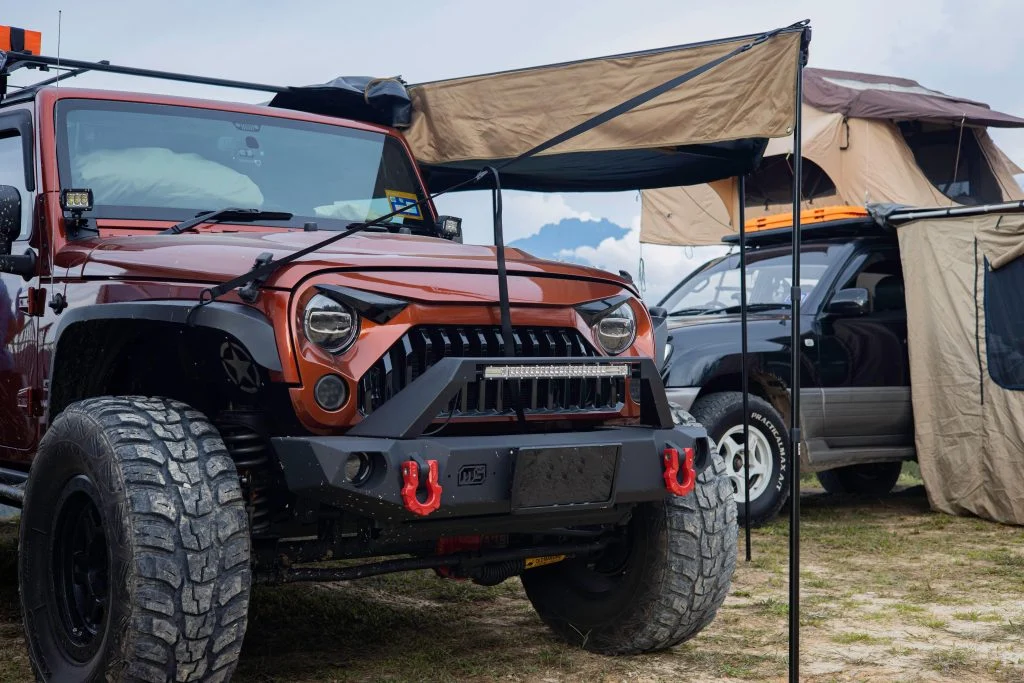Are you a proud Jeep Wrangler owner looking to take your outdoor adventures to the next level? Camping with your Wrangler can be an incredible experience, allowing you to explore remote locations and enjoy the beauty of nature. To ensure you have the best possible experience, we've compiled a list of essential Jeep Wrangler camping tips.
Prepare Your Jeep Wrangler for Camping
Before embarking on your camping trip, it's crucial to ensure your Jeep Wrangler is in top condition. Here are some key steps to take:
- Perform a thorough maintenance check: Inspect your vehicle's fluids, brakes, tires, and other critical components to ensure they are in good working order. This includes checking the oil level, coolant, brake fluid, and power steering fluid. Also, check the air filter and replace it if necessary. Don't forget to check the tire pressure and adjust it according to the manufacturer's recommendations for off-road driving.
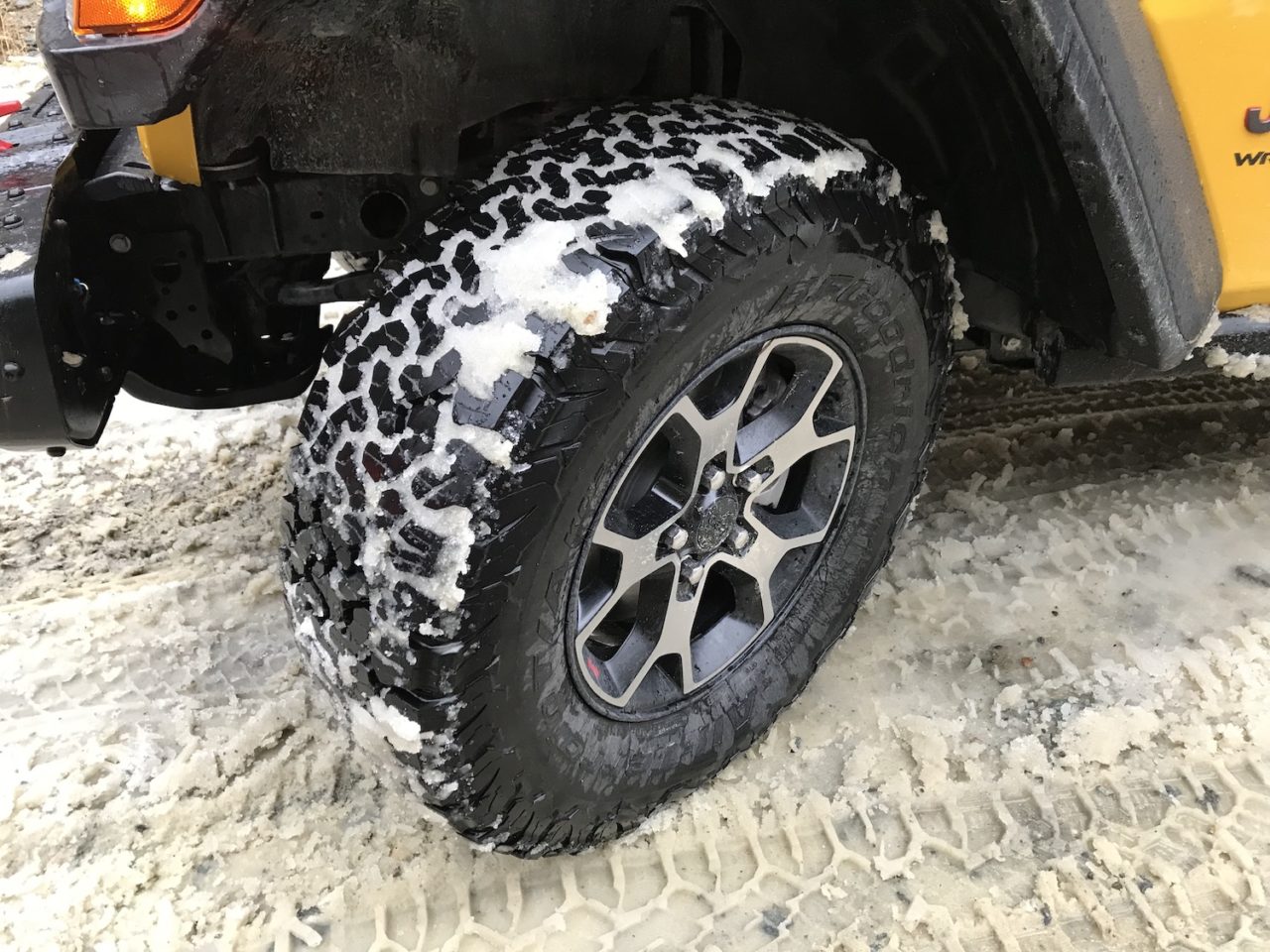
- Upgrade your tires: If you plan on tackling rough terrain, consider investing in high-quality all-terrain or mud-terrain tires for improved traction and durability. These tires are designed to handle various off-road conditions, such as mud, rocks, and sand. They also have a more aggressive tread pattern that provides better grip and stability on uneven surfaces.
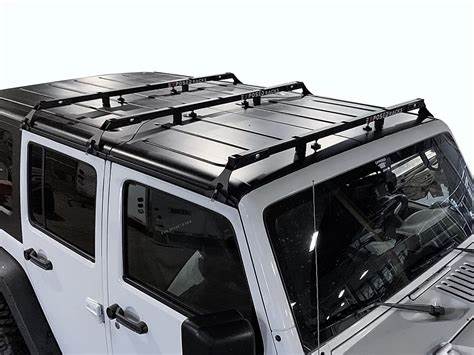
- Install a roof rack or cargo carrier: This will provide additional storage space for your camping gear, freeing up room inside your Jeep. A roof rack allows you to carry bulky items like tents, sleeping bags, and coolers, while a cargo carrier can be attached to the rear of your Jeep for extra storage capacity. Make sure to choose a rack or carrier that is compatible with your Wrangler model and has a sufficient weight capacity.
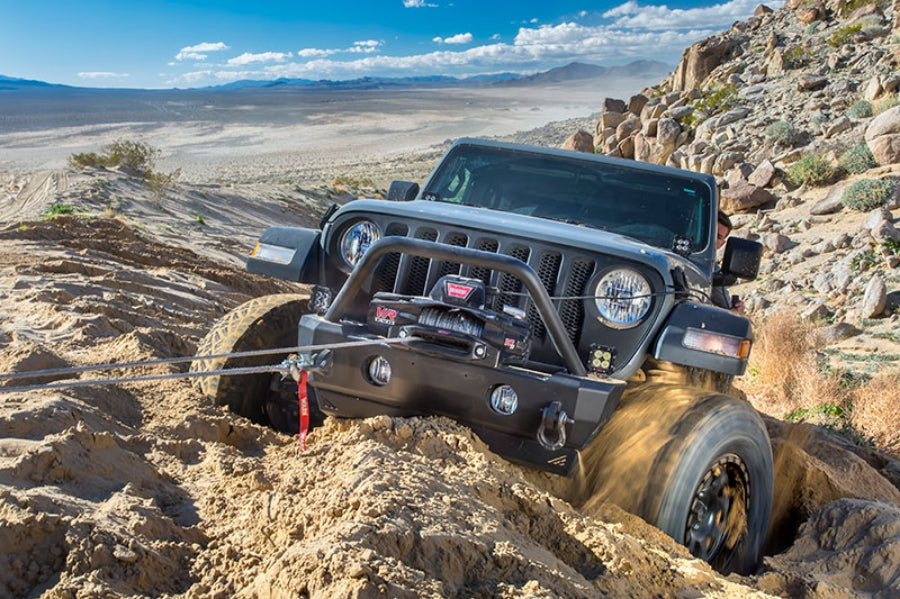
- Add a winch: A winch can be a lifesaver if you get stuck in mud or need to clear obstacles from your path. It is a powerful tool that can pull your Jeep out of tough situations and help you navigate challenging terrain. When choosing a winch, consider factors such as pulling capacity, cable length, and motor power. Also, make sure to learn how to use the winch safely and properly before your trip.
- Install additional lighting: When camping in remote areas, you may encounter dark trails and campsites. Installing additional lighting on your Jeep Wrangler can improve visibility and safety. Consider adding LED light bars, fog lights, or spotlights to your vehicle. These lights can be mounted on the roof, bumper, or grille, depending on your preferences and needs.
- Protect your Jeep's interior: Camping can be messy, with mud, dirt, and water getting inside your vehicle. To protect your Jeep's interior, consider installing all-weather floor mats and seat covers. These accessories are designed to be durable, easy to clean, and resistant to moisture and stains. They will help keep your Wrangler's interior looking new and prevent damage from outdoor elements.
Choose the Right Camping Gear
When camping with your Jeep Wrangler, it's essential to pack the right gear. Here are some must-have items:
- Tent: Choose a tent that is easy to set up and provides adequate protection from the elements. Rooftop tents are a popular choice among Jeep campers, as they offer a comfortable and convenient sleeping setup. They can be mounted directly on your Wrangler's roof rack, saving space on the ground and keeping you elevated from potential hazards like insects and small animals. Ground tents are another option, providing more flexibility in terms of campsite selection and setup.
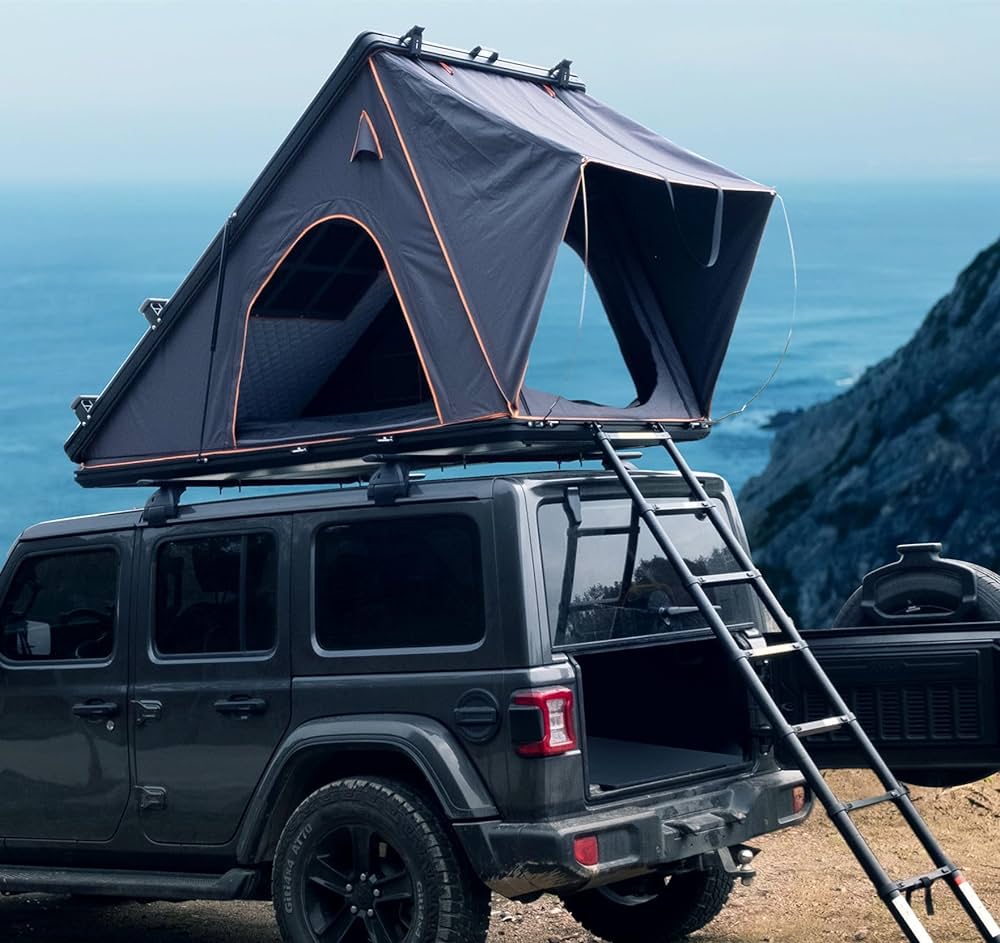
- Sleeping bags and pads: Invest in high-quality sleeping bags and pads to ensure a comfortable night's sleep. Consider the temperature rating of the sleeping bag, as well as its insulation type and shape. Mummy-style bags are popular for their warmth and efficiency, while rectangular bags offer more room to move around. Sleeping pads provide insulation from the cold ground and additional cushioning for improved comfort.
- Cooking equipment: Pack a portable stove, cookware, and utensils for preparing meals at your campsite. A compact camping stove that runs on propane or butane is a convenient option, allowing you to cook food and boil water quickly. Don't forget to bring pots, pans, plates, cups, and eating utensils. Consider packing a cooler to keep your food and drinks fresh and cold throughout your trip.
- Lighting: Bring headlamps, lanterns, and flashlights to illuminate your campsite after dark. Headlamps are especially useful for hands-free lighting while setting up camp or performing tasks. Lanterns can provide ambient light for your campsite, while flashlights are handy for navigating in the dark or signaling for help in emergency situations. Make sure to pack extra batteries or choose rechargeable options.
- First-aid kit: Always carry a well-stocked first-aid kit in case of emergencies. Your kit should include items like bandages, antiseptic wipes, pain relievers, tweezers, and any personal medications you may need. It's also a good idea to include a snake bite kit and insect repellent, especially if you're camping in areas where these hazards are present.
- Water storage and filtration: Staying hydrated is crucial when camping, so make sure to bring plenty of water storage containers. Large water jugs or collapsible water bags are convenient options for storing water at your campsite. If you plan on camping near natural water sources like rivers or lakes, consider bringing a water filtration system or purification tablets to ensure the water is safe to drink.
- Recovery gear: In case you encounter any obstacles or get stuck while off-roading, it's important to have recovery gear on hand. This can include items like tow straps, D-rings, a shovel, and a hi-lift jack. These tools can help you get your Jeep Wrangler out of tough situations and back on the trail.
Plan Your Route and Campsites
Before setting out on your Jeep Wrangler camping trip, it's important to plan your route and campsites. Here are some tips to keep in mind:
- Research your destination: Look for information on the terrain, weather conditions, and any potential hazards you may encounter. This can include things like water crossings, steep inclines, and rocky surfaces. Check local weather forecasts and be prepared for any changes in conditions. It's also a good idea to familiarize yourself with the local wildlife and any necessary precautions to take.
- Choose campsites wisely: Select campsites that are accessible by your Jeep Wrangler and offer the amenities you need, such as water sources and flat ground for pitching your tent. Look for sites that are well-maintained and have designated fire pits or grills. Consider the proximity to hiking trails, fishing spots, or other recreational activities you may want to enjoy during your trip.
- Make reservations in advance: If you plan on staying at a popular campground, be sure to make reservations well in advance to secure your spot. Many campgrounds, especially those in national parks or forests, can fill up quickly during peak seasons. Making reservations ensures that you have a guaranteed spot and can help you plan your trip more efficiently.
- Have a backup plan: Always have an alternate route or campsite in mind in case your initial plans fall through. This could be due to unexpected closures, weather conditions, or other unforeseen circumstances. Having a backup plan can help you avoid disappointment and ensure that you still have a enjoyable camping experience.
- Use navigation tools: To help you navigate to your campsites and explore the surrounding areas, consider using navigation tools like GPS devices, topographic maps, and compass. These tools can help you stay on track and avoid getting lost in unfamiliar terrain. Make sure to familiarize yourself with how to use these tools before your trip and always carry a physical map as a backup.
- Inform others of your plans: Before setting out on your camping trip, make sure to inform family or friends of your planned route and campsites. This can be important in case of emergencies or if you need to be reached while on the trail. Leave a detailed itinerary with someone you trust and establish a check-in schedule to ensure your safety.
Practice Safe and Responsible Camping
When camping with your Jeep Wrangler, it's crucial to practice safe and responsible camping habits. Here are some guidelines to follow:
- Follow Leave No Trace principles: Always pack out your trash, minimize campfire impacts, and respect wildlife. This means properly disposing of waste, using established fire pits or camp stoves, and avoiding feeding or disturbing animals. By practicing Leave No Trace principles, you can help preserve the natural beauty of the areas you visit and ensure that future generations can enjoy them as well.
- Adhere to fire restrictions: Check for any fire restrictions in the area and follow them closely to prevent wildfires. This may mean avoiding campfires altogether or using designated fire pits only. Make sure to fully extinguish any fires before leaving your campsite and never leave a fire unattended. In some cases, you may need to use alternative cooking methods like camp stoves instead of open flames.
- Stay on designated trails: Avoid driving off-trail to minimize damage to the environment and prevent getting stuck. Off-trail driving can cause erosion, damage vegetation, and disturb wildlife habitats. Stick to established trails and roads whenever possible, and if you do need to navigate around an obstacle, try to do so in a way that minimizes your impact on the surrounding area.
- Be prepared for emergencies: Carry a reliable means of communication, such as a satellite phone or two-way radio, in case of emergencies. Make sure to have a well-stocked first-aid kit on hand and know how to use it. Familiarize yourself with the symptoms of common outdoor ailments like hypothermia, heat exhaustion, and dehydration, and know how to treat them. It's also a good idea to have a plan in place for emergency situations like vehicle breakdowns or injuries.
- Respect other campers: Be mindful of noise levels and respect other campers' privacy. Avoid playing loud music or making excessive noise, especially late at night or early in the morning. Keep your campsite clean and tidy, and don't encroach on other campers' spaces. If you're camping with pets, make sure to keep them under control and clean up after them.
- Know your limits: Don't attempt to tackle terrain or trails that are beyond your skill level or the capabilities of your Jeep Wrangler. It's important to know your limits and avoid putting yourself or your vehicle in dangerous situations. If you're unsure about a particular route or obstacle, it's better to err on the side of caution and find an alternative way around.
Conclusion
Camping with your Jeep Wrangler is an incredible way to explore the great outdoors and experience the beauty of nature. By following these essential tips, you can ensure that your camping trips are safe, enjoyable, and memorable.
To make the most of your Jeep Wrangler camping experience, be sure to prepare your vehicle, choose the right gear, plan your route and campsites, and practice safe and responsible camping habits. With your Wrangler as your trusty companion, you'll be ready to tackle any adventure that comes your way.
So, what are you waiting for? Pack up your gear, hit the trail, and let your Jeep Wrangler be your guide to unforgettable outdoor adventures. With a spirit of exploration and a love for the great outdoors, you'll create memories that will last a lifetime. Happy camping!

